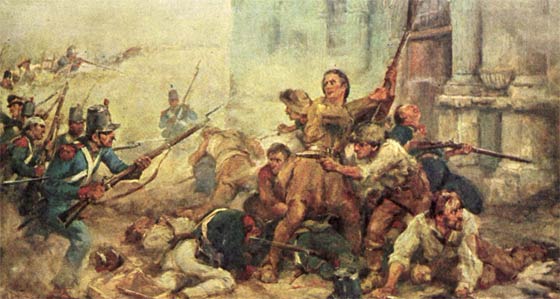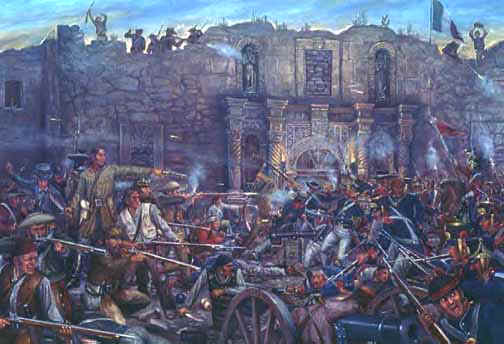John Sowers Brooks to Sister. Fort Defiance Goliad, Texas. March 4, 1836.
My dear Sister: Another opportunity of writing to you occurs, and I embrace it because they are infrequent, and becoming hourly more so. The precarious channel, through which all letters must arrive at, or go from this place, affords, indeed, the only satisfactory explication of your mysterious silence; and the belief that yours have been intercepted or miscarried, is consoling indeed, for it renders doubtful what, in my moments of desperation, I have often-feared is- certain-that you had forgotten your poor, wayward brother. Why is it so? Why have you not written? War, it is true, "opens a vein that bleeds Nations to death," but why should it invade the sanctity of social connection? Why should it dissolve fraternal bonds or sunder domestic ties? Is it necessary that we should be morally, as well as physically separated? That the associations of infancy, the remembrances of child hood, the anticipations of youth, and the common pleasures, hopes, and fears of better and happier days, should be forgotten and we pursue our weary and desolate track through life, as if neither had existed? Is it necessary because we are separated, because the billows of the Atlantic, or the Pillars of the Alleghany are between us, that all the ties which bound us, in other days should be severed? I trust not. Why then do you not avail yourself of that medium of communion, which language proffers? Have I rendered myself unworthy of your affection? I know my course, since I left home, has been erratic in the extreme. But can you conceive of no reason why it has been so? If you can recall the events of the last few years, you must; if you can not, you may then perhaps, with justice, censure me for that reckless indifference, to my hopes and prospects in life, with which, I have so often been charged. It is true that I have passed unimproved many opportunities of acquiring the good opinion of my fellow men, but why was it so? Because early misfortunes have broken and seared a heart, perhaps too sensitive, and blighted all the hopes which a disposition too sanguine, has prompted me to form and cherish. Can I change the fiat of fate? Can I control the waves of mighty destiny?
My life has indeed, been a wayward and useless one; and you can not be more sensible of it, or more sincerely deplore it, than myself. But, notwithstanding all my faults and follies, I have never failed in respect for the soil of birth, regard for my native village, love for my home, or affection for my relatives. I have never forgotten: and many an hour of my loneliness has been consumed by thoughts of them. Often has the recollection of the past and of you, arrested me on the brink of acts of deeper recklessness, and of more irremediable desperation so far as this world is concerned, than any I had hitherto committed, Still a latent hope that I may see you all again, and be once more happy, swells my throbbing bosom. But there is some thing, I know not what, which whispers me, that the hope is destined to no realization on earth.
I am acting, my dear sister, in that sphere which nature designed me to fill. I am a soldier of fortune; and all the premonitions of my child hood early told me that I should be one. My profession, perhaps for life, be it short or long, will be that of arms. It is the only pursuit in which I could feel a throb of interest; and the cause in which I now exercise it, renders it still dearer, and more ennobling to me. It is the course of Liberty, of the oppressed against the Tyrant, of the free man against the bigoted slave, and, what recommends it more strongly to me, of the weak against the strong. If I fall, let me fall---It is one of the chances of the game I play-a casualty to which every soldier is liable. My prayer has been, since my earliest recollection, to die on the field of battle, with the shout of victory in my ears; and, if it is the will of high Heaven, that that fate should meet me now, I will not murmur and you should not. Remember that your religion teaches that death is but a change of scene.
But all this is of no avail. Perhaps a brief retrospect of the events of our campaign, up to this period, would be interesting to you. On the 24th day of January 1836, the Georgia Battalion of Volunteers, (of which I was Adjutant), consisting of four Companies, sailed from Velasco, at the Mouth of the Brazos, in two vessels. Our object was primarily, to attack and take Matamoras, and thus form a point of rendezvous, and concentration for volunteers from the U. States, for a more extensive invasion of Mexico. Our intention was to allow Liberal principles, and support for the time, the federation of 1824, and thus revolutionize Tamaulipas, the greater portion of whose citizens are opposed to Santa Ana, and to secure our foot hold in Mexico. The fourth day, we debarked at Copano, and after a days march, we pitched our tents at the Mission of Refugio, and waited for the promised munitions and reinforcements. They never arrived. In the mean time, our spy, who had preceded us, returned with the intelligence, that the people of Tamaulipas were opposed to any severance of the Republican bonds, and would not favor our project, if Texas declared itself independent. Ile also informed us, that Santa Ana was concentrating his troops, to the number, of from 7 to 12,000 men, at Matamoras, Laredo, Saltillo, Monclova, and Monterey, for the purpose of invading Texas, and punishing his rebellious subjects, with a war of extermination. We retreated to Goliad, and commenced fortifying and preparing for the threatened storm. We have remained here ever since, busily employed, in getting in provisions, military stores, picketing, ditching, and mounting cannon, for our defence.
Santa Ana's army is now in motion, and our almost unprotected frontier, is the destined goal of its operations. One of his divisions has already attacked Bexar, the town which was surrendered to the Americans, ou the 18th Dec. 1835, by the Mexican General, Cos, which garrison consisted of only 156 Volunteers, who retreated to the Alamo, a strong fortress in the suburbs, and still held out, at our last intelligence. "Davy Crockett" is with them. The Mexicans amounted to 2000. We started with 300 men to their relief, but found it impossible to proceed, from the want of horses or oxen, to transport our baggage and artillery. While deliberating on what steps to take, intelligence reached us that 200 Mexicans, the advance guard to the division of their army, which was destined to operate against this portion of our frontier, had attacked and totally defeated, Col. Johnson and his force of 40 men at San Patrico, a town on the Rio de la Neuces, about 60 miles in front of our position. Only five escaped, among whom was Col. Johnson and Mr. Toler, a merchant. We are in hourly expectation of an attack; but, from the want of horses, we are unable to obtain any accurate information of the strength or movements of the enemy. We suppose their force to be from 1500 to 3000 men. We have but 500-all Volunteers. But we are resolved to die, to a man, under the walls we have thrown up, rather than surrender to a horde of merciless savages, who have declared their determination to adhere to none of the rules of civilized war fare; but to murder all Americans, indiscriminately. Capt. Pearson and several others were shot down, after they had surrendered at San Patricio. This on the part of the enemy, is to be a war of extermination, not directed solely against the armed soldiers in the field, but against the peaceful citizen, the helpless female, and the defenceless infant. They show no quarter; we do not require it; and, indeed, both parties seem to have tacitly contracted, that it shall neither be asked nor given. Let them pursue their course of ruthless cruelty; they will encounter spirits as stern as their own; they will find, if retaliation requires it, that we can be as deaf to the calls of mercy as they can be. If victory favors us, ample shall be their retribution, for the murdered volunteers at San Patricio.
We have just learned that Col. Grant with 22 men, has been attacked by 200 Mexicans, on the road from San Patricio to Matamoras, 15 miles from the former place, and his whole party, with the exception of two who escaped, killed or taken. Col. Grant is a prisoner. Up to this time, they have uniformly killed all the Americans they take, and it is reasonable therefore, to infer that not one of that ill fated party survived. We will prob ably be attacked before I can write you again. The advance of the enemy is within 25 miles of us. If we are defeated, it will be after a hard fight. Tell every one of the family to write to me, and mail their letters different days. Events arc thickening upon us. I will write to you again, the first opportunity that occurs. In the mean time write to me by several different mails; and if I die, reflect that it will be in a good cause. Give my love to all the family. Your affectionate brother, John Sowers Brooks. Direct your letters to John Sowers Brooks, Volunteer Army of Texas, to the care of Col. J. W. Fannin, Jr., or to Quintana, Mouth of the Brazos, to the care of Messrs. McKinney & Williams. It has been four months since I have heard from home. On my arrival at Goliad, I was appointed Adjutant of the Post. I have been transferred to the General's Staff, as Aid-de-Camp. I am nearly naked, almost barefooted, and without a cent of money. We have, had nothing but beef for several days. We suffer much and labor hard in repairing the Fort. [on verso:] Will Mess. McKinney & Williams, please forward this letter to U.S. by first opportunity and oblige, J. S. B.










